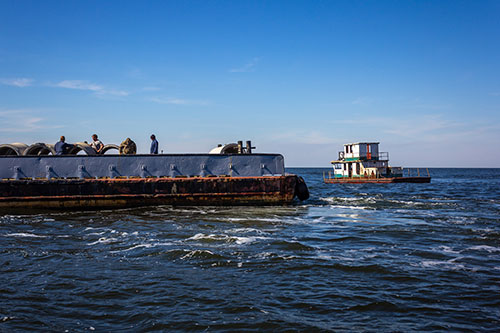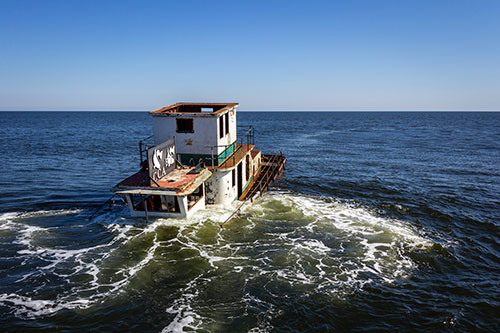March 11, 2021

Concrete culvert pipes (left) and retired tugboat (right) preparing to join the McClellanville Reef roughly 10 miles offshore. (Photo: Kaitlyn Hackathorn/SCDNR)
Anglers and fish alike can enjoy an expanded CCA-McClellanville Reef (PA-34) as of this week.
On Tuesday, March 9, South Carolina Department of Natural Resources (SCDNR) and Coastal Conservation Association South Carolina (CCA SC) staff took advantage of calm seas and beautiful weather to add a retired tugboat and 24 four-foot diameter concrete culvert pipes concrete culvert pipes to the existing artificial reef in 50 feet of water. The tugboat and culverts joined numerous other structures that form the reef, including remnants of the former Cooper River Bridge, concrete structures and a 105' tugboat. The new reef additions were funded in part by CCA SC and in part by funds provided through the purchase of saltwater fishing licenses. "The Coastal Conservation Association has been a tremendous help to us in getting high-quality material distributed along our coast," said SCDNR artificial reef coordinator Bob Martore. "Vessels like this provide an excellent foundation for a reef community because their complexity attracts a wide variety of species."
Artificial reefs play a similar role as coral reefs, which cannot grow in the temperate waters off the coast of South Carolina. These human-built structures are typically placed on areas of seafloor with little natural relief, improving habitat and spawning grounds for a diverse array of fish and marine life – and in turn attracting recreational divers and anglers.

The retired tugboat begins sinking to join the CCA-McClellanville Reef on the seafloor. (Photo: Kaitlyn Hackathorn/SCDNR)
"Today's deployment marks another fantastic collaborative effort between the conservation community, private industry, and state government that benefits both fish and fishermen" said Scott Whitaker, CCA SC executive director. "Enhancing habitat and expanding access for recreational anglers are two of the cornerstones in CCA SC's coastal initiative plan and we are excited about the additional projects planned for 2021 and beyond."
SCDNR has been constructing artificial reefs to improve offshore fish populations and recreational opportunities for over forty years, sinking everything from bridge spans to military vehicles to subway cars. The environmental benefits of artificial reefs are twofold, as they recycle materials that would otherwise be destined for landfills in addition to expanding critical habitat for offshore fish. Structures intended for artificial reefs undergo a long and rigorous cleaning process to ensure they're safe to sink.
South Carolina is home to dozens of artificial reef sites, the location data for which are free to download to your marine GPS device.



